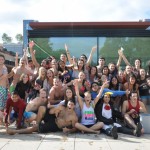Dear Charlotte,
We would like to thank you for your interest in the College Volunteer Program at xxxxxxxxxx Hospital. We receive a large number of application requests, yet we have a limited number of openings for new Volunteers. This means that we are not able to accommodate all requests. At this time, your request was not selected. We would however, like to encourage you to make another request in the future.
This is an email that I recently received in response to an application to become a volunteer at a local hospital. Unfortunately, this type of response for this type of position is not abnormal.
* Before I go any further, I feel the need to clarify a few things. Academically and occupationally, I am specifically interested in clinical work and clinical research. During my time at Scripps, I’ve found that commonly available lab bench work, while informative and a useful scientific experience, can be tiresome and not as fulfilling as I hoped it would be. This, however, is just my personal preference. If you are inspired and excited by bench work, please do not get discouraged by this blog post. Scripps College has some amazing opportunities to conduct research and I suggest that you speak with one of the many W.M. Keck Science Department faculty, as they are always open and willing to accept new research students.
As I stated above, I am a more of a clinical buff. I’ve developed my opinions surrounding science during my time at the Claremont Colleges and I have come to the conclusion that, for me, it is vitally important to share your knowledge and experience with those in need. (This is how I developed my career goal of genetic counseling, which, if you are interested in discussing or learning more about, please leave a comment on this post.) Exposure to the clinical world is key in developing a solid foundation for further studies, ie. medical school. However, as an undergraduate, these types of opportunities have been incredibly difficult to obtain. The doctors or practitioners we would normally consult with for these positions site the regulations surrounding patient privacy as one of the biggest obstacles facing a non-certified student. In my experience, doctors also tend to display an misunderstanding as to the depth of research in which undergraduates may be involved. While I may be speaking from a Scripps perspective, it is not necessarily common for undergraduates at large universities to be conducting research alongside professors and mentors. However, even traditional research may not be enough of an active gateway for most undergraduate clinical internships and applications.
In the summer of my sophomore year, I was accepted into the Children’s Hospital Oakland Research Institute (CHORI) Summer Student Program. I was ecstatic when I was accepted, as, from what I’d read and heard, I thought that this would be the perfect program for me. While I realized during the internship that research was not for me, I was given the unique opportunity to shadow one of the doctors at the Children’s Hospital Oakland, a direct affiliate of the institute. I observed a genetic counselor for one or two days during the CHORI program. I saw her actively working with patients, which really got my blood pumping. In the past, I’d only been able to hypothesis about my love for patient work, but had never had the chance to see these connections actually being made. She became my guiding light, who helped to believe that I would, and could, make my way into the clinical world.
Nowadays, I am being a bit more selective in my internship and job searches, making sure that I will be participating in meaningful and interesting work. Slowly but surely, I am learning the best, most successful ways of getting involved (as it is still not always easy) and gaining experience by volunteering in the absence of structured internship programs. (Tip for all you clinically-minded science students: volunteering and interning are equally beneficial and valid experiences in the eyes of medical and graduate schools. They both imply a specialized set of acquired skills that are valuable and worth your time). Like always, hindsight is 20-20 and I do wish that I could have learned some of these lessons earlier on. However, I am still thankful for all of the experience I have gained through my internship missteps and I am currently looking forward for what the future can bring me.



